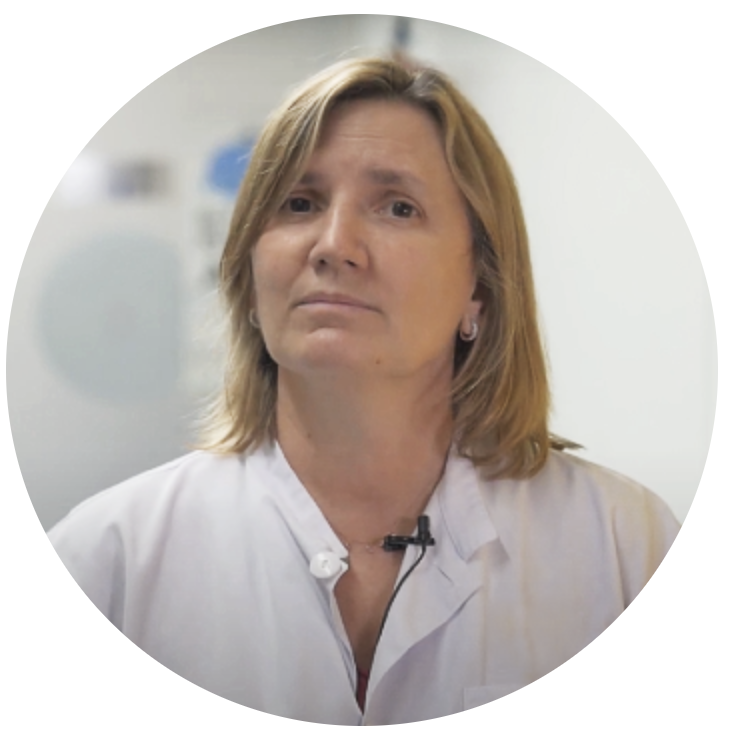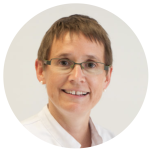11 February, 2023
barnaclínic+ highlights the importance of women in research
Science research has been essential for our development as a society. Thanks to it, many questions have been answered and it has been possible to find solutions to important problems. In the field of Medicine, this research constitutes one of its fundamental pillars, along with care and teaching. Through it, it has been possible to improve the diagnosis and treatment of patients, significantly increasing our hope and quality of life. To make its importance visible, and on the occasion of the International Day of Women and Girls in Science, barnaclínic+ has given a voice to some of the main researchers in its medical staff, doctors Bàrbara Vidal, Marta Sitges, Elena Millà, Elizabeth Barba, Susana Puig and Isabel Vilaseca express their opinion on the value of science and the important role of women in research.
FIGHTING FOR EQUALITY BETWEEN MEN AND WOMEN IN RESEARCH
Despite its transcendental importance, for a long time, women have had great difficulties in gaining access to research. Some difficulties were not inherent to her condition as a woman but were more related to her role in society. This has meant that for a long time, we have not been taking advantage of our full potential, having only half the population for research by excluding women.
The efforts dedicated in more recent times to achieve gender equality have served to improve this issue. But there is still a long way to go. According to United Nations data, women tend to receive more modest research grants than their male colleagues and, although they represent 33.3% of all researchers, only 12% of members of national scientific academies are women.
The United Nations also points out that female researchers tend to have shorter careers and lower pay. Their work is underrepresented in high-profile magazines and they are often overlooked for promotions. This low representation of women becomes even more accentuated in cutting-edge fields such as artificial intelligence, where only one in five professionals is a woman.
THE IMPORTANCE OF VISIBILITY: THE INTERNATIONAL DAY OF WOMEN AND GIRLS IN SCIENCE
To try to improve and advance in this regard, since 2015 the International Day of Women and Girls in Science has been celebrated every February 11, in recognition of the key role played by women in the scientific community and technology. This year, on the occasion of the celebration of this event, barnaclínic+ wanted to give a voice to some of the women who work in research at the Clínic de Barcelona through a video.
The doctors Bàrbara Vidal, Marta Sitges, Elena Millà, Elizabeth Barba, Susana Puig and Isabel Vilaseca have wanted to contribute their vision on the importance of research and also serve as inspiration so that other women can dedicate themselves to research in the future. Making their important work visible is the first step to normalising the presence of women in research and understanding the need to fight for gender equality.
VERY EARLY VOCATION OF RESEARCH
When did the vocation of being a researcher arise? All the participants in the video have pointed out that this vocation was already very early, manifesting itself in the years of studying Medicine. “When one begins to study medicine, one wonders why diseases happen and how we could do things better. Questions arise from our daily practice that we then investigate”, explains Dr Marta Sitges, director of the Instituto Cardiovascular del Clínic and barnaclínic+ cardiologist.
“When one begins to study medicine, one wonders why diseases happen and how we could do things better. Questions arise from our daily practice that we then investigate”
Dr Marta Sitges, barnaclínic+ cardiologist
Dr Susana Puig, head of the Dermatology Service at the Clínic de Barcelona and specialist in Dermatology at barnaclínic+ adds how the need to improve patient care drove her to research during her studies. “I believe that interest in research is practically innate in medical students” adds Dr Bàrbara Vidal, head of the Cardiac Imaging Section of the Cardiology Service of the Clínic and also a specialist in de barnaclínic+ Cardiology.
THE GLASS CEILING STILL EXISTS AND MUST BE BROKEN
Despite these vocations, the experts have pointed out how difficult it is for women to still be able to develop their careers as researchers today. “The role of women in research continues to be somewhat limited by all the circumstances that surround their world, especially maternity and the difficulty of reconciling family and work life many times”, says Dr Isabel Vilaseca, Head of the Otorhinolaryngology Oncology Section at the Clínic and ENT barnaclínic+ professional. This difficulty of family reconciliation was also highlighted by Dr Marta Sitges. “We still find ourselves with many limitations at the level of competitiveness precisely because of this difficult reconciliation of personal and work life.”
“The role of women in research continues to be somewhat limited by all the circumstances that surround their world, especially maternity and the difficulty of reconciling family and work life many times”
Dr Isabel Vilaseca, ENT barnaclínic+ professional
Dr Elizabeth Barba, consultant to the Digestive Motility Unit of the Gastroenterology Service of the Clínic de Barcelona and barnaclínic+, acknowledges that this situation for women has improved nonetheless. “I am fortunate to be one of the women who has been able to investigate throughout her life and this has been possible thanks to the fact that other women have preceded all this effort for me.” Dr Elena Millà, a en Glaucoma consultant for the Clínic’s Ophthalmology Service and a professional at visiõnclínic+, acknowledges these advances, but she emphasizes them. “There is still some work to be done and a long way to go because equality between men and women is still not exact.”
“I am fortunate to be one of the women who has been able to investigate throughout her life and this has been possible thanks to the fact that other women have preceded all this effort for me”
Dr Elizabeth Barba, gastroenterologist at barnaclínic+
One of the pieces of evidence of this lack of equality is what people call the glass ceiling, the barrier that prevents women from accessing positions of responsibility. “You just have to go to college and see that the percentage of women who study medicine is greater than that of men. On the other hand, they are lacking in places of responsibility, both as leaders of research groups and in command positions”, said Dr Bàrbara Vidal. Dr Susana Puig similarly expressed herself. “When we look at the international rankings, the most predominant places are occupied mostly by men and women occupy second place. We have to ask ourselves if this is a vestige of the past or if now, we women are acquiring the same position as our colleagues.”
“When we look at the international rankings, the most predominant places are occupied mostly by men and women occupy second place. We have to ask ourselves why…”
Dra. Susana Puig, dermatologist at barnaclínic+
On this issue, Dr Bàrbara Vidal also contributed her vision, who pointed out the importance of social awareness of women. “It is necessary to make it understood that gender equality does not yet exist, that there is a glass ceiling and that it is necessary to break it. And that we finally believe ourselves that we can lead teams and do it as well as our fellow men”.
“It is necessary to make it understood that gender equality does not yet exist, that there is a glass ceiling and that it is necessary to break it”
Dr Bàrbara Vidal, cardiologist at barnaclínic+







